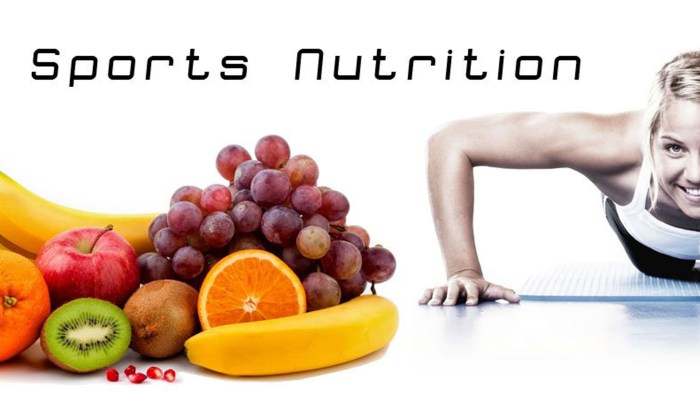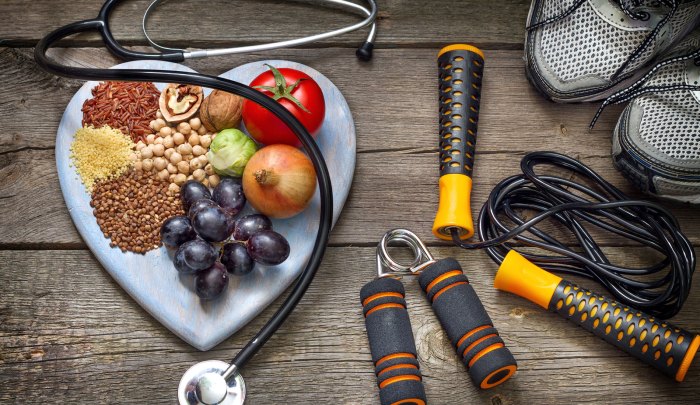Sports nutrition is the key to unlocking peak performance and quick recovery for athletes, diving into the world of macronutrients, micronutrients, hydration, and more.
Discover the secrets to optimizing your diet for maximum gains and optimal results.
Importance of Sports Nutrition
Proper sports nutrition plays a crucial role in enhancing athletes’ performance and aiding in their recovery. By fueling the body with the right nutrients, athletes can optimize their training, improve endurance, and reduce the risk of injuries.
Impact of Proper Nutrition on Athletic Abilities
- Enhanced Energy Levels: Consuming the right balance of macronutrients such as carbohydrates, proteins, and fats provides athletes with the energy needed to perform at their best.
- Improved Recovery: Proper nutrition helps in speeding up the recovery process post-workout, allowing athletes to bounce back quicker and train more effectively.
- Optimal Muscle Growth: Adequate protein intake supports muscle repair and growth, crucial for athletes looking to increase strength and power.
Role of Macronutrients and Micronutrients in Sports Nutrition
- Macronutrients: Carbohydrates are essential for providing energy during exercise, proteins aid in muscle repair and growth, and fats play a role in hormone production and nutrient absorption.
- Micronutrients: Vitamins and minerals are crucial for various bodily functions, including immune system support, bone health, and energy production.
- Hydration: Proper fluid intake is key for maintaining optimal performance and preventing dehydration, which can negatively impact athletic abilities.
Macronutrients in Sports Nutrition

In sports nutrition, macronutrients play a crucial role in optimizing athletic performance and supporting overall health. Carbohydrates, proteins, and fats are the three main macronutrients that athletes need to focus on to fuel their bodies effectively.
Significance of Carbohydrates
Carbohydrates are the body’s primary source of energy, especially during high-intensity exercise. They are stored in the muscles and liver as glycogen, which can be quickly converted into energy when needed. Athletes should focus on consuming complex carbohydrates like whole grains, fruits, and vegetables, which provide a steady release of energy and help maintain blood sugar levels.
Types of Carbohydrates for Athletes
– Simple Carbohydrates: Provide quick energy but can lead to rapid spikes and crashes in blood sugar levels. Examples include candies, white bread, and sugary drinks.
– Complex Carbohydrates: Take longer to break down, providing sustained energy levels. Examples include oats, brown rice, and sweet potatoes.
– Fiber: A type of carbohydrate that aids in digestion and helps maintain satiety. Sources include beans, lentils, and whole grains.
Importance of Protein Intake
Proteins are essential for muscle repair, growth, and recovery after intense workouts. Athletes should aim to include high-quality sources of protein in their diet, such as lean meats, poultry, fish, eggs, dairy products, and plant-based options like tofu and legumes. Adequate protein intake is crucial for maintaining muscle mass and supporting optimal athletic performance.
Micronutrients and Hydration
When it comes to sports nutrition, micronutrients play a crucial role in supporting athletic performance and overall health. These essential vitamins and minerals help regulate various bodily functions, including energy production, muscle function, and immune response. Additionally, proper hydration is key for maintaining optimal performance, as even mild dehydration can negatively impact athletic abilities.
Key Micronutrients for Athletes
- Vitamin D: Essential for bone health and muscle function, important for athletes who train indoors or in low sunlight environments.
- Iron: Necessary for oxygen transport in the blood, vital for endurance athletes to prevent fatigue and maintain energy levels.
- Zinc: Supports immune function and protein synthesis, crucial for recovery and muscle repair post-exercise.
Importance of Hydration in Sports Performance
Proper hydration is essential for maintaining body temperature, transporting nutrients, and removing waste products during physical activity. Dehydration can lead to decreased performance, muscle cramps, and fatigue.
Tips for Electrolyte Balance During Exercise
- Stay Hydrated: Drink water regularly before, during, and after workouts to maintain fluid balance.
- Include Electrolytes: Consume sports drinks or electrolyte-enhanced water to replace lost minerals like sodium and potassium through sweat.
- Eat Balanced Meals: Include foods rich in electrolytes like bananas, nuts, and leafy greens in your diet to support muscle function.
Pre-Workout and Post-Workout Nutrition

When it comes to optimizing your performance and recovery in sports, paying attention to your pre-workout and post-workout nutrition is crucial. A well-balanced diet tailored to your training needs can make a significant difference in how you feel during exercise and how quickly you recover afterward.
Sample Pre-Workout Meal Plan
Before a workout, you want to fuel your body with the right nutrients to ensure optimal energy levels. A sample pre-workout meal plan could include a combination of carbohydrates, protein, and healthy fats. Here’s an example:
- Whole grain toast with almond butter and banana slices
- Greek yogurt with berries and a sprinkle of granola
- Grilled chicken with quinoa and roasted vegetables
Best Post-Workout Nutrition Strategies
After a workout, your body needs nutrients to repair muscles, replenish glycogen stores, and rehydrate. The best post-workout nutrition strategies focus on protein and carbohydrates to aid in recovery. Consider these options:
- Protein shake with whey protein, banana, and almond milk
- Salmon with sweet potatoes and steamed broccoli
- Greek yogurt with mixed nuts and honey
Timing of Nutrient Intake, Sports nutrition
To maximize the benefits of your pre-workout and post-workout nutrition, timing is key. Ideally, you should consume a balanced meal or snack 1-2 hours before exercise to allow for digestion. After your workout, aim to refuel within 30 minutes to 2 hours to optimize recovery. Remember to hydrate before, during, and after your workout to support overall performance and well-being.